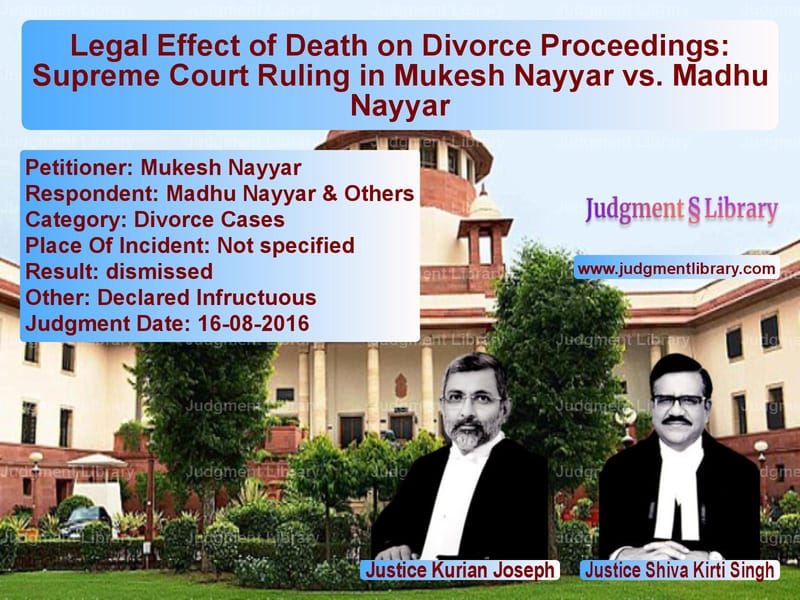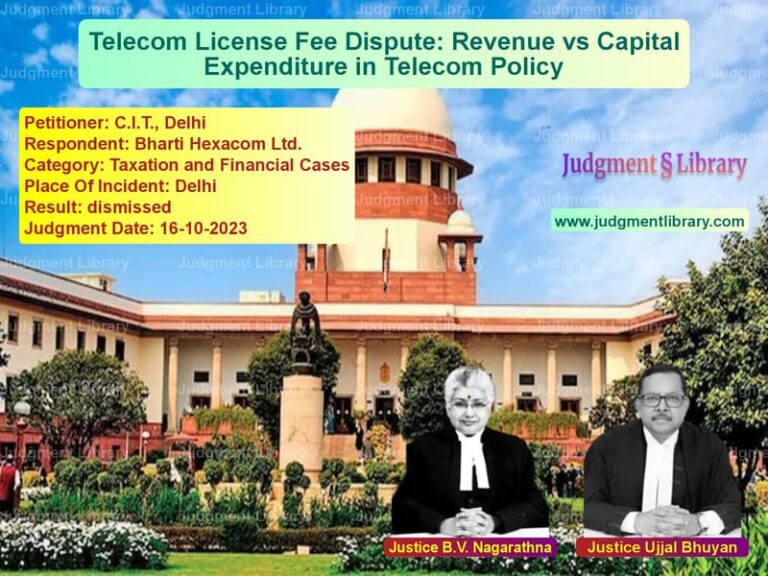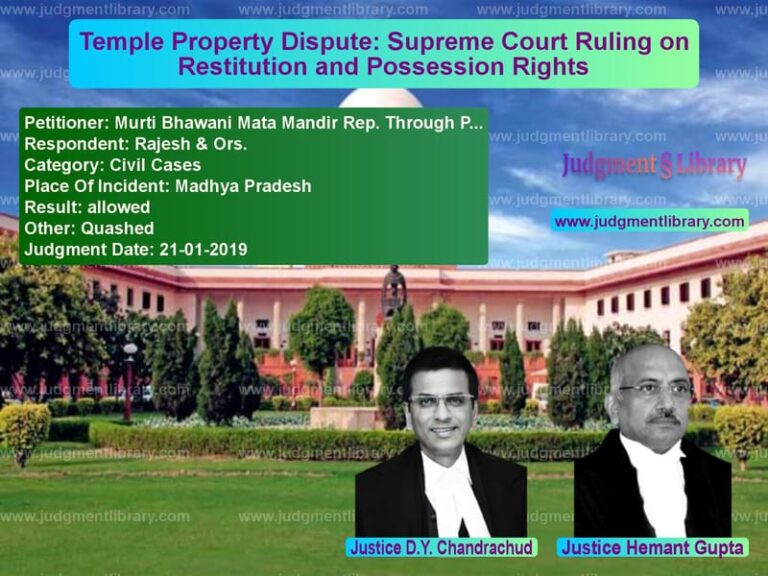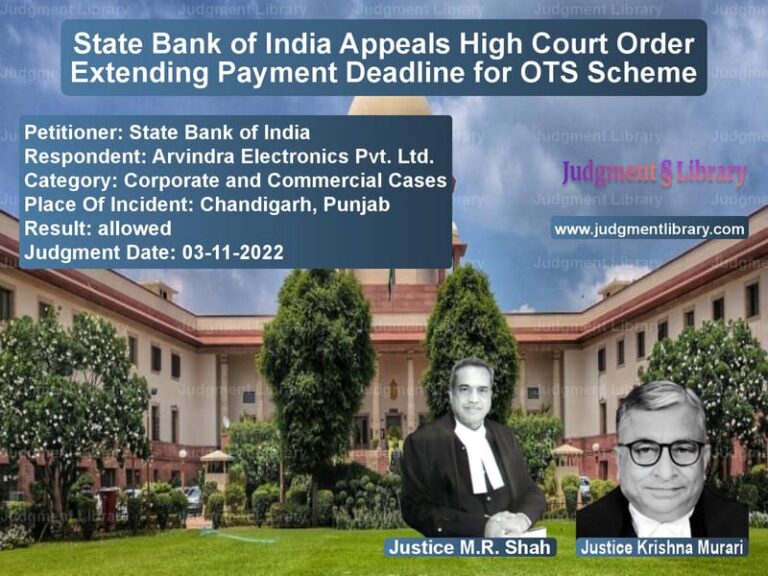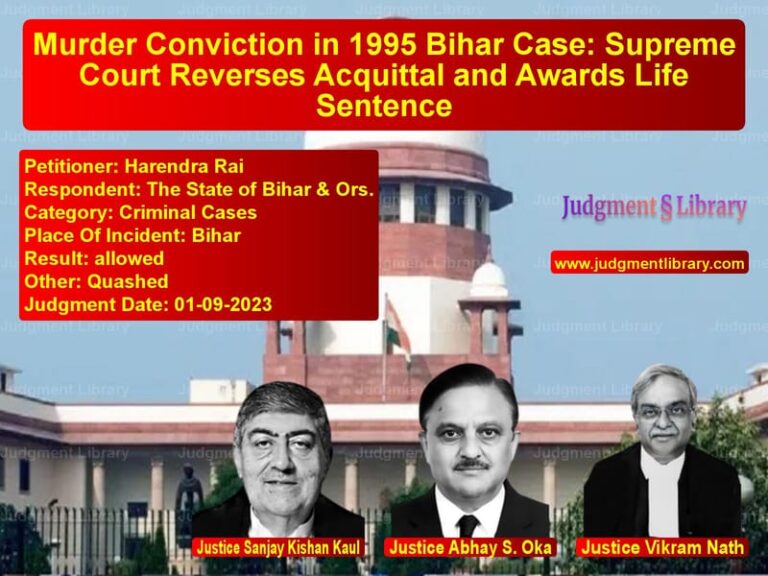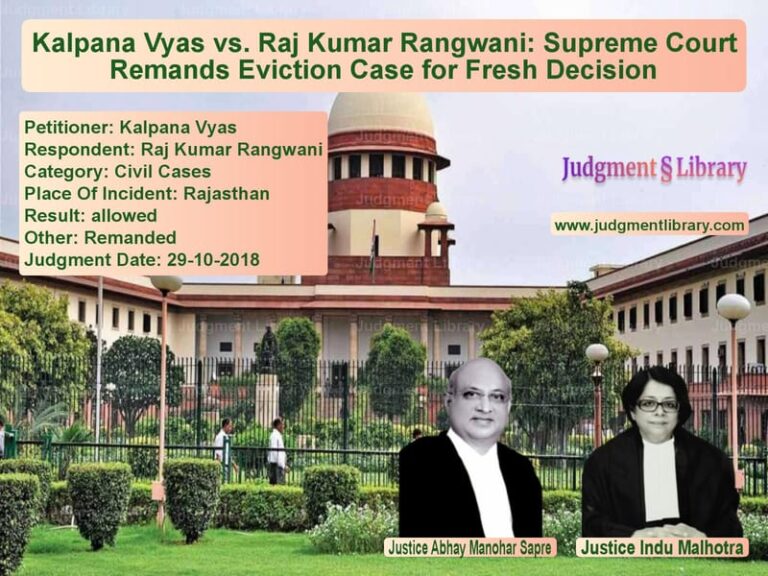Legal Effect of Death on Divorce Proceedings: Supreme Court Ruling in Mukesh Nayyar vs. Madhu Nayyar
The case of Mukesh Nayyar vs. Madhu Nayyar & Others before the Supreme Court of India addressed an important legal question—whether a pending divorce appeal becomes infructuous upon the death of one of the parties. The appeal was filed by Mukesh Nayyar, who had originally obtained a divorce decree from the Trial Court, but the High Court overturned this decision. However, during the pendency of the appeal before the Supreme Court, Mukesh Nayyar passed away. The Court ultimately dismissed the appeal, stating that no cause of action survived.
Background of the Case
The dispute arose between Mukesh Nayyar (the appellant) and his estranged wife, Madhu Nayyar (the respondent). The appellant had filed for divorce on specific grounds and was granted a decree by the Trial Court. However, the respondent challenged this ruling before the High Court, which set aside the divorce, restoring the marital status of the couple.
The appellant, aggrieved by the High Court’s order, approached the Supreme Court, seeking the restoration of the divorce decree. However, before the appeal could be adjudicated, he passed away on June 13, 2016.
Legal Questions Before the Court
The Supreme Court was required to decide:
- Whether a pending appeal in a divorce case becomes infructuous if one of the spouses dies before its resolution.
- Whether any legal consequences remain for the surviving spouse.
- If any rights, particularly related to property or inheritance, survive despite the abatement of the divorce appeal.
Arguments by the Appellant
The appellant, Mukesh Nayyar, had approached the Supreme Court with the following contentions:
- The High Court erred in overturning the divorce decree granted by the Trial Court.
- The grounds for divorce, as established in the Trial Court, were valid and legally justifiable.
- The marital relationship had irretrievably broken down, warranting divorce.
- The High Court did not correctly appreciate the evidence presented in the Trial Court.
Arguments by the Respondent
The respondent, Madhu Nayyar, countered these claims with the following assertions:
- The High Court had rightly intervened in setting aside the divorce decree.
- The appellant had not provided adequate justification for the divorce.
- The appeal had no merit, and the High Court’s decision should be upheld.
- Upon the death of the appellant, no cause of action for divorce remained.
Supreme Court’s Observations
The Supreme Court, after hearing both parties, examined the implications of the appellant’s demise. The Court ruled:
“Since the appellant is no more, no cause of action survives. Therefore, the appeal is dismissed.”
However, the Court also clarified that if there were any surviving legal issues concerning property or inheritance, the concerned parties could pursue them through appropriate legal channels. The Court explicitly stated:
“We make it clear that in case of any surviving grievance with regard to the property or any other things, it will be open to the parties concerned, if aggrieved or interested, to pursue the same in appropriate proceedings.”
Legal Precedents and Implications
The judgment in this case reinforces certain established legal principles:
- Abatement of Divorce Cases Upon Death: Once a spouse dies, the question of divorce becomes moot, as the marriage is automatically dissolved.
- Survival of Property and Financial Claims: While the divorce appeal was dismissed, the Court left room for disputes related to financial matters or property claims to be pursued separately.
- Effect on Marital Status: The dismissal of the appeal means that legally, at the time of his death, Mukesh Nayyar remained married to Madhu Nayyar.
Impact on Related Legal Matters
The ruling clarifies that while a divorce appeal abates upon death, certain legal consequences remain relevant:
1. Inheritance Rights
Since the divorce appeal was dismissed, the deceased appellant was still legally married at the time of his death. This means that under inheritance laws, the surviving spouse may have rights over the deceased’s estate unless explicitly denied in a will.
2. Pending Property Disputes
If there were ongoing disputes related to property division, those claims would not be automatically dismissed. The Supreme Court expressly allowed interested parties to pursue such claims through appropriate legal proceedings.
3. Financial Settlements
In cases where a financial settlement was under consideration as part of the divorce proceedings, the surviving spouse might still have legal grounds to claim maintenance or other financial benefits.
4. Implications for Family Law Practitioners
Family law practitioners can take note of this judgment as it highlights that while the primary cause of action (divorce) abates, associated claims regarding finances and property can continue.
Comparative Analysis with Other Jurisdictions
In various legal systems across the world, the death of a party in a divorce case often leads to similar legal outcomes:
- In the United States, family courts generally hold that a divorce case abates upon the death of a party, as the marriage is automatically terminated.
- In the United Kingdom, divorce proceedings also end upon the death of a spouse, but financial claims can still be pursued under the Inheritance (Provision for Family and Dependants) Act 1975.
- In Indian law, similar principles apply, with the Supreme Court’s ruling affirming that divorce proceedings abate upon death, though property and financial claims may continue.
Conclusion
The Supreme Court’s ruling in Mukesh Nayyar vs. Madhu Nayyar reaffirms the principle that divorce proceedings become infructuous upon the death of one of the parties. However, it also ensures that related legal matters, such as inheritance and financial claims, remain open for further litigation. This judgment clarifies the legal position for courts, lawyers, and individuals involved in family disputes, ensuring that appropriate remedies remain available even after the primary case is dismissed.
Don’t miss out on the full details! Download the complete judgment in PDF format below and gain valuable insights instantly!
Download Judgment: Mukesh Nayyar vs Madhu Nayyar & Other Supreme Court of India Judgment Dated 16-08-2016-1741878573339.pdf
Direct Downlaod Judgment: Direct downlaod this Judgment
See all petitions in Alimony and Maintenance
See all petitions in Property Division in Divorce Cases
See all petitions in Judgment by Kurian Joseph
See all petitions in Judgment by Shiva Kirti Singh
See all petitions in dismissed
See all petitions in Declared Infructuous
See all petitions in supreme court of India judgments August 2016
See all petitions in 2016 judgments
See all posts in Divorce Cases Category
See all allowed petitions in Divorce Cases Category
See all Dismissed petitions in Divorce Cases Category
See all partially allowed petitions in Divorce Cases Category

